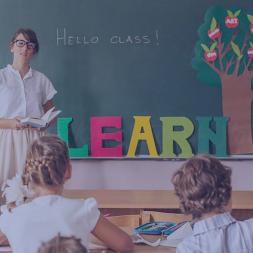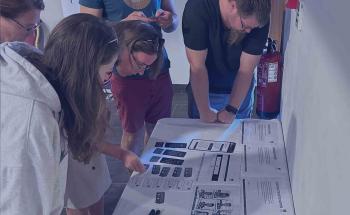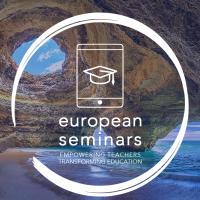
Bridging the Gap between Content and Language Content and Language - Integrated Learning (CLIL) in Schools
In today's multilingual educational landscape, the power of learning a language through content is undeniable. CLIL as a methodology holds the key to engaging students in a dynamic and collaborative way.
This workshop is designed to give participants a comprehensive understanding of all aspects of CLIL, from lesson planning to assessment, from strategical techniques to sociocultural development.
Description
What is CLIL and why do I need it?
CLIL, Content and Language Integrated Learning, is an approach to teaching where subjects are taught in a language that is not the students' first language. For example, science or history might be taught in English to students whose first language is not English. As a teacher, CLIL can be a valuable tool for several reasons:
Language Development: CLIL provides an immersive language learning environment where students are exposed to the target language in a meaningful context. This can greatly enhance their language skills, including vocabulary acquisition, fluency, and comprehension.
Content Learning: By teaching subjects in a second language, students are not only learning language skills but also gaining knowledge in other academic areas. This interdisciplinary approach allows students to develop a deeper understanding of both the subject matter and the language.
Cultural Awareness: CLIL encourages students to engage with different cultures and perspectives, as they explore subjects from a global standpoint. This can foster cultural awareness and empathy, important skills in our interconnected world.
Cognitive Skills: Engaging with content in a second language challenges students cognitively, leading to improved problem-solving abilities, critical thinking skills, and academic resilience.
Preparation for Global Citizenship:
In today's globalized world, proficiency in more than one language is increasingly valuable. CLIL equips students with the language skills and cultural competence they need to communicate and collaborate effectively across borders.
As a teacher, implementing CLIL can enrich your teaching practice by offering a dynamic and interactive approach to language and content instruction. It allows you to cater to diverse learners and create an inclusive classroom environment where students can thrive academically and linguistically.
Learning objectives
How you will expand your knowledge:
As educators this workshop will provide you with an informative, collaborative and creative environment in which we can continue to support and learn from each other in our shared mission to shape the future of education.Through meaningful inputyou will learn, as your students can learn, what it means to not only teach in a CLIL approach but also to learn in a CLIL approach.
The strategies and insights gained here will inspire you to continue growing as educators and create enriching learning experiences for your students.
Benefits of CLIL in Bilingual Education:
Integrating content and language provides students with meaningful and relevant ways of acquiring a second language and it creates motivating and engaging ways of learning while crossing borders and cultures and while developing students’ communicative and cognitive skills.
CLIL is also considered as a way of making language learning accessible to all learners, regardless of socio economic status, rather it provides them with the opportunity to learn additional languages in a meaningful way.
Methodology & assessment
Certification details
The seminar lasts 48 hours and consists of theoretical and practical units, as well as a constant exchange of specialist knowledge. In addition to plenary sessions, discussions in small groups and joint workshops, individual working groups will develop and present their own projects. You will also have plenty of free time outside of the seminar program to enjoy the benefits of the Algarve.
Become part of the europeanseminars experience!
As part of our concept, seminar participants are always accommodated together in a four-star hotel and can also exchange ideas outside the official program during meals and coffee breaks. Your physical well-being is taken care of with full catering with delicacies that are always of a local character. We also invite you to dine outside the hotel in an exclusive and typical way - a unique culinary experience.
We are deeply rooted in the Algarve and enable you to immerse yourself in the culture of Portugal by showing you our very personal treasures of the region on two cultural excursions, taking you to our favorite places and bringing you into contact with the country and its people - intercultural understanding with a personal touch and lots of fun.
The seminar will take place at the 4-star Hotel AGUA RIVERSIDE LAGOA Quinta Do Parchal (Algarve) in Portugal (subject to change). The course fees are 580€, the cost for the stay in a single room with full board is 896€. The total cost is usually fully subsidized by the EU.
Pricing, packages and other information
-
Price:1476Euro
Additional information
-
Language:English
-
Target audience ISCED:Primary education (ISCED 1)Lower secondary education (ISCED 2)Upper secondary education (ISCED 3)
-
Target audience type:TeacherHead Teacher / PrincipalSchool Psychologist
-
Learning time:25 hours or more
Past sessions
More courses by this organiser

Game based-Learning mit KI, Escape Room- und Escape Game-Design im Schulkontext (deutschsprachig)

Resilience in the Classroom - Empowering Educators, Strengthening Learners: Tools and Strategies for Well-being in the school cosmos


